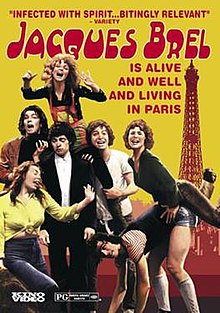Jacques Brel Is Alive and Well and Living in Paris (film)
| Jacques Brel Is Alive and Well and Living in Paris |
|
|---|---|

DVD cover
|
|
| Directed by | Denis Héroux |
| Produced by | Paul Marshall |
| Written by | Eric Blau |
| Starring |
Mort Shuman Elly Stone Joe Masiell |
| Music by |
Jacques Brel Gérard Jouannest |
| Cinematography | René Verzier |
| Edited by | Yves Langlois |
|
Production
company |
American Film Theatre
|
| Distributed by | American Film Theatre |
|
Release date
|
|
|
Running time
|
98 minutes |
| Country |
|
| Language |
|
Jacques Brel Is Alive and Well and Living in Paris is a 1975 French/Canadian musical film directed by Denis Héroux. The screenplay by Eric Blau is an adaptation of his book for the long-running off-Broadway revue of the same name. The score is composed of songs with music by Jacques Brel and his accompanist Gérard Jouannest and English translations of the original French lyrics by Blau and Mort Shuman.
Jacques Brel Is Alive and Well and Living in Paris was produced and released by the American Film Theatre, which adapted theatrical works for a subscription-driven cinema series. It was the second of two musical films created by the American Film Theatre, following Lost in the Stars in 1974.
The film opens in a puppet theater, where three audience members—a military officer, a taxi driver, and a woman on a shopping trip—discover they are being depicted as marionette caricatures against a backdrop of newsreel footage from the 1920s through the 1950s. They find themselves trapped backstage amidst bizarre circumstances ... the puppet master is found dead above the stage, a gigantic plaster hand drops from the ceiling to the floor, and a deafening siren blares endlessly. The trio escapes from the theater to a beach, where the military officer locates the siren and kicks it, causing it to blow up.
The film then resumes the stage show's plotless structure. In this version, different cinematic interpretations are used to illustrate the show's score. A straightforward approach is for some songs: "Bachelor's Dance" finds a bartender singing out loud of his potential mate while eyeing the female patrons of his establishment, while "Amsterdam" places a weary inebriate in a barroom corner while he watches the mix of sailors and sexual predators pass by his table. Other songs are interpreted in a surreal manner: with "Marieke," images of a large red ball bouncing off a cliff are mixed with that of Elly Stone, dressed in a suit and tie, pursuing a little girl amidst the headstones of a cemetery.
...
Wikipedia
